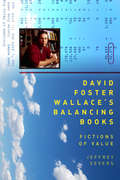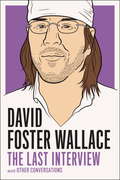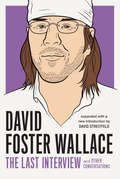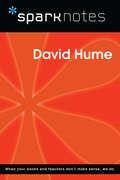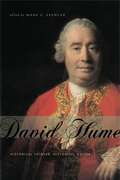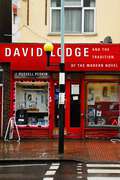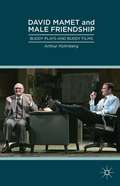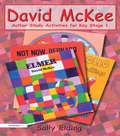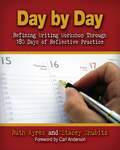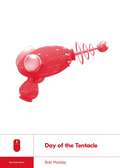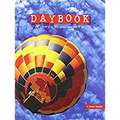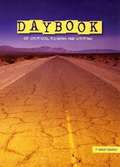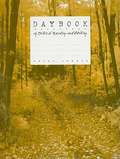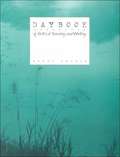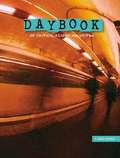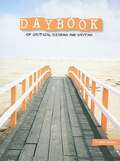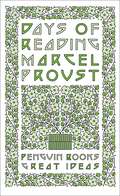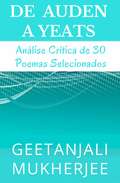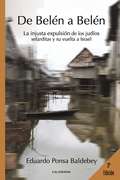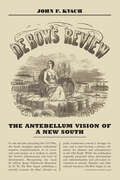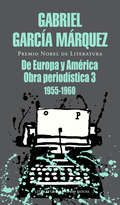- Table View
- List View
David Foster Wallace's Balancing Books: Fictions of Value
by Jeffrey SeversThe writing of David Foster Wallace transformed the root and branch of contemporary fiction, introducing a formal inventiveness that moved authors away from an emotionless postmodern irony. Critics have pointed to Wallace’s exploration of morality and a return to sincerity as the central concerns of his work. However, as Jeffrey Severs argues in David Foster Wallace’s Balancing Books, the author was also deeply engaged with the social, political, and economic issues of the twentieth and twenty-first centuries. A rebellious economic thinker, Wallace not only satirized the deforming effects of money but also questioned the logic of the monetary system. In his original readings of all of Wallace’s fiction, from The Broom of the System and Infinite Jest to the story collections and The Pale King, Severs reveals Wallace to be a thoroughly political writer whose works provide an often surreal history of financial crises and neoliberal policies.As Severs demonstrates, balance and value are crucial to the work of Wallace, who constantly asks us to consider what we value and why. The concept of value is where his major interests intersected: economics, work, metaphysics, mathematics, and morality. Severs also details how Wallace’s writing explores the quest for balance in a world of excess and entropy. Wallace showed characters struggling to place two feet on the ground and restlessly sought to balance the books of a chaotic culture. Explaining why Wallace’s work has galvanized a new phase in contemporary global literature, Severs draws connections to key forerunners Don DeLillo, Thomas Pynchon, and William Gaddis, as well as successors-including Dave Eggers, Teddy Wayne, Jonathan Lethem, and Zadie Smith-interpreting Wallace’s legacy in terms of finance, the gift, and office life.
David Foster Wallace's Balancing Books: Fictions of Value
by Jeffrey SeversWhat do we value? Why do we value it? And in a neoliberal age, can morality ever displace money as the primary means of defining value? These are the questions that drove David Foster Wallace, a writer widely credited with changing the face of contemporary fiction and moving it beyond an emotionless postmodern irony. Jeffrey Severs argues in David Foster Wallace's Balancing Books that Wallace was also deeply engaged with the social, political, and economic issues of the twentieth and twenty-first centuries. A rebellious economic thinker, Wallace satirized the deforming effects of money, questioned the logic of the monetary system, and saw the world through the lens of value's many hidden and untapped meanings. In original readings of all of Wallace's fiction, from The Broom of the System and Infinite Jest to his story collections and The Pale King, Severs reveals Wallace to be a thoroughly political writer whose works provide an often surreal history of financial crises and economic policies.As Severs demonstrates, the concept of value occupied the intersection of Wallace's major interests: economics, work, metaphysics, mathematics, and morality. Severs ranges from the Great Depression and the New Deal to the realms of finance, insurance, and taxation to detail Wallace's quest for balance and grace in a world of excess and entropy. Wallace showed characters struggling to place two feet on the ground and restlessly sought to "balance the books" of a chaotic culture. Explaining why Wallace's work has galvanized a new phase in contemporary global literature, Severs draws connections to key Wallace forerunners Don DeLillo, Thomas Pynchon, and William Gaddis, as well as his successors—including Dave Eggers, Teddy Wayne, Jonathan Lethem, and Zadie Smith—interpreting Wallace's legacy in terms of finance, the gift, and office life.
David Foster Wallace: and Other Conversations (The Last Interview Series)
by David Foster WallaceIn intimate and eloquent interviews, including the last he gave before his suicide, the writer hailed by A.O. Scott of The New York Times as "the best mind of his generation" considers the state of modern America, entertainment and discipline, adulthood, literature, and his own inimitable writing style.In addition to Wallace's last interview, the volume features a conversation with Dave Eggers, a revealing Q&A with the magazine of his alma mater Amherst, his famous Salon interview with Laura Miller following the publication of Infinite Jest, and more.These conversations showcase and illuminate the traits for which Wallace remains so beloved: his incomparable humility and enormous erudition, his wit, sensitivity, and humanity. As he eloquently describes his writing process and motivations, displays his curiosity by time and again turning the tables on his interviewers, and delivers thoughtful, idiosyncratic views on literature, politics, entertainment and discipline, and the state of modern America, a fuller picture of this remarkable mind is revealed.
David Foster Wallace: and Other Conversations (The Last Interview Series)
by David Foster Wallace David StreitfeldAn expanded edition featuring new interviews and an introduction by the editor, a New York Times journalist and friend of the authorA unique selection of the best interviews given by David Foster Wallace, including the last he gave before his suicide in 2008. Complete with an introduction by Foster Wallace's friend and NY Times journalist, David Streitfeld. And including a new, never-before-published interview between Streitfeld and Wallace.
David Hume (SparkNotes Philosophy Guide)
by SparkNotesDavid Hume (SparkNotes Philosophy Guide) Making the reading experience fun! SparkNotes Philosophy Guides are one-stop guides to the great works of philosophy–masterpieces that stand at the foundations of Western thought. Inside each Philosophy Guide you&’ll find insightful overviews of great philosophical works of the Western world.
David Hume: Historical Thinker, Historical Writer
by Mark G. SpencerThis volume provides a new and nuanced appreciation of David Hume as a historian. Gone for good are the days when one can offhandedly assert, as R. G. Collingwood once did, that Hume “deserted philosophical studies in favour of historical” ones. History and philosophy are commensurate in Hume’s thought and works from the beginning to the end. Only by recognizing this can we begin to make sense of Hume’s canon as a whole and see clearly his many contributions to fields we now recognize as the distinct disciplines of history, philosophy, political science, economics, literature, religious studies, and much else besides. Casting their individual beams of light on various nooks and crannies of Hume’s historical thought and writing, the book’s contributors illuminate the whole in a way that would not be possible from the perspective of a single-authored study.Aside from the editor, the contributors are David Allan, M. A. Box, Timothy M. Costelloe, Roger L. Emerson, Jennifer Herdt, Philip Hicks, Douglas Long, Claudia M. Schmidt, Michael Silverthorne, Jeffrey M. Suderman, Mark R. M. Towsey, and F. L. van Holthoon.
David Hume: Historical Thinker, Historical Writer
by Mark G. SpencerThis volume provides a new and nuanced appreciation of David Hume as a historian. Gone for good are the days when one can offhandedly assert, as R. G. Collingwood once did, that Hume “deserted philosophical studies in favour of historical” ones. History and philosophy are commensurate in Hume’s thought and works from the beginning to the end. Only by recognizing this can we begin to make sense of Hume’s canon as a whole and see clearly his many contributions to fields we now recognize as the distinct disciplines of history, philosophy, political science, economics, literature, religious studies, and much else besides. Casting their individual beams of light on various nooks and crannies of Hume’s historical thought and writing, the book’s contributors illuminate the whole in a way that would not be possible from the perspective of a single-authored study.Aside from the editor, the contributors are David Allan, M. A. Box, Timothy M. Costelloe, Roger L. Emerson, Jennifer Herdt, Philip Hicks, Douglas Long, Claudia M. Schmidt, Michael Silverthorne, Jeffrey M. Suderman, Mark R. M. Towsey, and F. L. van Holthoon.
David Lodge and the Tradition of the Modern Novel
by J. Russell PerkinDavid Lodge is a much-loved novelist and influential literary critic. Examining his career from his earliest publications in the late 1950s to his more recent works, David Lodge and the Tradition of the Modern Novel identifies Lodge's central place within the canon of twentieth-century British literature. J. Russell Perkin argues that liberalism is the defining feature of Lodge's identity as a novelist, critic, and Roman Catholic intellectual, and demonstrates that Graham Greene, James Joyce, Kingsley Amis, Henry James, and H.G. Wells are the key influences on Lodge's fiction. Perkin also considers Lodge's relationship to contemporary British novelists, including Hilary Mantel, Julian Barnes, and Monica Ali. In a study that is both theoretically informed and accessible to the general reader, Perkin shows that Lodge's work is shaped by the dialectic of modernism and the realist tradition. Through an approach that draws on diverse theories of literary influence and history, David Lodge and the Tradition of the Modern Novel provides the most thorough treatment of the novelist's career to date.
David Lodge and the Tradition of the Modern Novel
by J. Russell PerkinAn engaging study of one of the most popular contemporary British novelists.
David Mamet and Male Friendship
by Arthur HolmbergUsing insights from psychology, sociology, anthropology, and the history of sexuality, Holmberg explores the ambiguity that drives male bonding. Personal interviews with Mamet and with the actors who have interpreted his major roles shed light on how and why men bond with each other and complement close analysis of Mamet's texts.
David McKee: Author Study Activities for Key Stage 1 (A Health Care for Women International Publication)
by Sally EldingThis innovative series is designed to help primary teachers plan focused sessions on the work of popular, well-loved and valued authors, both classic and contemporary. Each book contains a range of activities for use directly in the classroom, covering biographical information about the author; a review of the author's work and a summary of major themes in his/her key texts; key language features of the author; frameworks to help children analyze, evaluate and compare texts, and to develop personal opinions of authors' works; ideas for writing modeled on or developed from key texts; speaking and listening opportunities; drama and role play ideas; and references to video, CD-ROM, websites and ICT activities. Inside each book is a full-color pullout poster illustrating the work of the author, which also has a set of challenges for children on the back. David McKee is an author and illustrator, creator of Mr Benn, King Rollo, and the ever-popular patchwork elephant, Elmer. Building on children's enjoyment of the characters and their adventures, this book presents activities that focus on narrative structure, character development, settings and themes. Most importantly, the activities are designed to make learning about stories as much fun as reading them. Games and activities include: fortunately/unfortunately and chain of events - exploring cause and effect; comparing plots - using a matrix to order information; looking for clues about Elmer - building a character sketch; mapping feelings - exploring character development; time talk and Isabel's diary - understanding setting, sequence and relationships between the two; making a story map - recognizing picture and context clues; comparing the video to the written text; and text detective work using extracts.
Day by Day: Refining Writing Workshop Through 180 Days of Reflective Practice
by Stacey Shubitz Ruth AyresHave you ever wanted your own personal writing coach to help improve your teaching of writing? How about two personal writing coaches? In Day by Day, Stacey Shubitz and Ruth Ayres, creators of the popular blog Two Writing Teachers, guide you through the trials and tribulations of a whole year of writing workshop. ' Day by Day is organized around six fundamental components of writing workshoproutines, mini-lessons, choice, mentors, conferring, and assessment. Each component is broken down into ten-day sections. Each section includes a detailed discussion, a challenge that teachers can apply immediately,' and questions to help teachers assess the process to see what went right, what went wrong, and, most importantly, why.' Ruth and Stacey also provide daily encouragement, support, practical strategies, tips, advice, and everything you need to run an effective writing workshop that meets the needs of all the different writers in your classroom.
Day of the Tentacle (Boss Fight Books)
by Bob MackeySix years after helping the Edison family defeat the designs of a malevolent meteor in Maniac Mansion, college student and classic nerd Bernard Bernoulli once again finds himself at the front door of the infamous mansion. With two weird friends, Hoagie and Laverne, Bernard must stop the evil Purple Tentacle from conquering the world—by freezing hamsters, pushing old ladies down the stairs, abusing Swiss bank accounts, and ever so slightly changing some of the most significant moments in American history. Dave Grossman and Tim Schafer&’s 1993 time-trotting point-and-click adventure game Day of the Tentacle brought LucasArts' game design to a new standard of excellence with smart puzzles, hilarious characters, and an animation style that harkened back to classic Warner Bros. cartoons. And somehow, they fit it all on a fat stack of floppy disks! In this definitive oral history as told by the game&’s designers, musicians, and artists, writer Bob Mackey tells the inside story of Day of the Tentacle&’s lightning-in-a-bottle production, and reveals how two first-time directors boiled down the lessons of past adventure games into a tight and satisfying experience, how their team grappled with evolving technology to achieve the coveted status of multimedia at the dawn of the CD-ROM age, and how a remastered edition brought Tentacle to a new generation of fans.
Daybook of Critical Reading and Writing (Grade #5)
by Laura Robb Michael F. Opitz Ellin Oliver KeeneA literature and language arts book that aims at harnessing the students' critiical reading and writing skills
Daybook of Critical Reading and Writing (Grade #6)
by Fran Claggett Louann Reid Ruth VinzThroughout this Daybook, you will read, respond to, and write about many different kinds of texts. You will read and write for a variety of purposes.
Daybook of Critical Reading and Writing (Grade #6)
by Great Source Education TeamThroughout this Daybook, you'll be asked to read and respond to many different kinds of literature. You'll circle, underline, and highlight. You'll make guesses, ask questions, and think about word meanings. You'll draw pictures, brainstorm, and do some writing of your own. In short, you'll look at what you read and what you write in many different ways. You'll learn to respond to literature in a whole new way by becoming an active reader.
Daybook of Critical Reading and Writing (Grade #7)
by Fran Claggett Louann Reid Ruth VinzEach level includes 80 lessons. Use them to fit your teaching schedule. Teach a lesson daily for single semester. Use within a block schedule format. Teach several times weekly for a school year.
Daybook of Critical Reading and Writing [Grade 7]
by Fran Claggett Louann Reid Ruth VinzNIMAC-sourced textbook
Daybook of Critical Reading and Writing [Grade 8]
by Fran Claggett Louann Reid Ruth VinzNIMAC-sourced textbook
Days of Reading (Penguin Great Ideas)
by Marcel ProustIn these inspiring essays about why we read, Proust explores all the pleasures and trials that we take from books, as well as explaining the beauty of Ruskin and his work, and the joys of losing yourself in literature as a child. Throughout history, some books have changed the world. They have transformed the way we see ourselves – and each other. They have inspired debate, dissent, war and revolution. They have enlightened, outraged, provoked and comforted. They have enriched lives – and destroyed them. Now Penguin brings you the works of the great thinkers, pioneers, radicals and visionaries whose ideas shook civilization and helped make us who we are.
De Auden a Yeats: Análise Crítica de 30 Poemas Selecionados
by Geetanjali Mukherjee Allan Felipe Rocha PenoniEste livro é uma referência pronta para alunos de Literatura Inglesa que querem ajuda para navegar pela poesia de alguns dos maiores poetas do final do século XIX e do século XX. O livro contém análises críticas profundas de 30 poemas selecionados das obras de W.H. Auden, Ted Hughes, John Keats, Philip Larkin e W.B. Yeats. Uma coletânia de 30 ensaios, o livro objetiva ajudar que alunos de literatura tenham uma visão geral da vida e do trabalho de casa poeta representado, assim como entender os poemas discutidos com suficiente profundidade. CARACTERÍSTICAS DO LIVRO * Uma seção sobre a vida e o histórico de cada poeta, para melhor entender as influências em sua poesia, e ter uma visão do contexto dos poemas selecionados * Uma explanação simples de cada poema * Explanações dos temas, motivos e símbolos usados nos poemas * Um ensaio dedicado para cada poema selecionado, analisando-os para o benefício do estudante de literatura * Perguntas curtas para que os alunos pensem sobre os temas mais profundos dos poemas Este é um guia inestimável para de literatura inglesa na escola ou universidade, ou para qualquer um que deseje obter uma compreensão mais apurada de alguns dos poemas mais reconhecidos do último século. Este livro funciona melhor como um guia de estudos, e não deve substituir a leitura de fato dos poemas (POEMAS NÃO INCLUSOS). Alguns poemas discutidos: * W.H. Auden - Refugee Blues * Ted Hughes - Crow Tyrannosaurus * Philip Larkin - The Whitsun Weddings * John Keats - To Autumn * W.B. Yeats - The Second Coming
De Belén a Belén: La injusta expulsión de los judíos sefarditas y su vuelta a Israel
by Eduardo Ponsa BaldebeyUna historia sobre la injusta expulsión de los judíos sefarditas y su vuelta a Israel. <P><P> Tuve suerte. Sí. <P><P>Antes de un año de acabada la carrera, con el título en el bolsillo y además trabajando, me vinieron a buscar: «Eduardo, hay un trabajo muy especial para ti en Sudamérica, contratado por tres años. <P>Te encaja: defender el tema de una patente que los norteamericanos quieren recuperar». <P>Allí, en Brasil, Uruguay y Argentina, me percaté de que, dentro de las muchas personas que tuve que tratar, los judíos eran los más duros y hábiles a la hora de negociar. <P>Pero ¡cuidado!, estos eran extremadamente serios, correctos y cumplidores: una vez cerrado un trato ya era «trato cerrado», y eso se agradecía. Esta experiencia, y lo que siempre he tenido como injusta expulsión, me condujeron a escribir sobre ello. <P> De Belén a Belén es una historia familiar, ficticia, aplicable a muchas otras de las expulsadas que se fueron a Sudamérica y que, con los años, los más jóvenes, ahora, desean para volver a instalarse en Israel, pasando previamente por Toledo, la antigua y primera capital de lo que hoy día ya es la España de la Península Ibérica, de donde injustamente, insisto, tuvieron que marchar.
De Bow's Review: The Antebellum Vision of a New South (New Directions In Southern History Ser.)
by John F. KvachA study of the nineteenth-century magazine from the American South, its editor, and influence on the region.In the decades preceding the Civil War, the South struggled against widespread negative characterizations of its economy and society as it worked to match the North’s infrastructure and level of development. Recognizing the need for regional reform, James Dunwoody Brownson (J. D. B.) De Bow began to publish a monthly journal?De Bow’s Review?to guide Southerners toward a stronger, more diversified future. His periodical soon became a primary reference for planters and entrepreneurs in the Old South, promoting urban development and industrialization and advocating investment in schools, libraries, and other cultural resources. Later, however, De Bow began to use his journal to manipulate his readers’ political views. Through inflammatory articles, he defended proslavery ideology, encouraged Southern nationalism, and promoted anti-Union sentiment, eventually becoming one of the South’s most notorious fire-eaters.In De Bow’s Review: The Antebellum Vision of a New South, author John Kvach explores how the editor’s antebellum economic and social policies influenced Southern readers and created the framework for a postwar New South movement. By recreating subscription lists and examining the lives and livelihoods of 1,500 Review readers, Kvach demonstrates how De Bow’s Review influenced a generation and a half of Southerners. This approach allows modern readers to understand the historical context of De Bow’s editorial legacy. Ultimately, De Bow and his antebellum subscribers altered the future of their region by creating the vision of a New South long before the Civil War.“Kvach fills a surprising gap in the history of the nineteenth-century South with this elegantly written biography of the enigmatic J. D. B. De Bow. The work represents an important contribution to a growing historiography exploring the presence of a middle-class commercial culture in the pre–Civil War South and challenging long-held views of a static socioeconomic world of planters and plain folk.” —Bruce W. Eelman, author of Entrepreneurs in the Southern Upcountry: Commercial Culture in Spartanburg, South Carolina, 1845-1880“An insightful, original, deeply researched work of scholarship. Examining not only the career of journalist J. D. B. De Bow but also the readers who responded enthusiastically to his call for economic diversification, John F. Kvach helps us see the nineteenth-century South in a new way, undistorted by the stark, artificial line so many historians have drawn to separate the so-called Old South from the New.” —Stephen V. Ash, author of A Massacre in Memphis: The Race Riot That Shook the Nation One Year after the Civil War“DeBow was the antebellum South’s most prominent advocate of economic modernization and industrialization, and one of its most vitriolic secessionists. John Kvach explores this seeming paradox, and gives us as well a careful description of DeBow’s subscribers and followers.” —J. Mills Thornton, University of Michigan
De Europa y América: Obra periodística, 3 (1955-1960)
by Gabriel García MárquezEn esta tercera entrega de la obra periodística del autor encontramos un período de intensas experiencias políticas, de dinamismo ideológico, de enriquecimiento estilístico. De Europa y América (1955-1960) cierra el período más activo de García Márquez en el campo del periodismo: período de intensas experiencias políticas, de dinamismo ideológico, de enriquecimiento estilístico. De hecho, estaba todo dispuesto para el esfuerzo creativo que inmediatamente había de traducirse en las páginas de La mala hora (1962) y, un lustro más tarde, en las de su obra maestra, Cien años de soledad. En las crónicas y reportajes que García Márquez enviaba allende el Atlántico, desde Ginebra, Roma, Venecia, Viena, París, el lector perspicaz hallará innumerables presagios de la gran obra literaria que incubaba el consagrado narrador colombiano.
